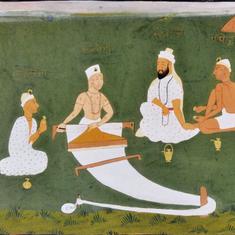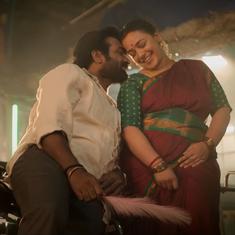I wasn’t invited to dinner, not directly, but I edged my way in anyway. It was a rather bold (foolish?) move for the newest recruit to make. In retrospect, I only have an egregious excitement to blame.
See, I was a pretty lonely kid. No friends, but mountains of books. For me, the cool kids’ table has always been the one with the smartest people, with someone reading Infinite Jest and a couple of others engaging in spirited debate (can Potter TRULY be called fantasy fiction?).
So when, during my first week at my first job, I overheard a plan being made for a group dinner at a shady-yummy Chinese restaurant, I had to get in on it. It was going to be a nice little crop of the intellectual elite: a commissioning editor and two associates, a literary critic of some note, a senior journalist (print) and a budding one (but television, news).
I knew the senior journalist a little. He had spent some time confusing a close friend; we had spent weeks trying to figure out whether he was complicated or just playing a sick game. In one day, out the next. Romantic signals layered over professional suggestions; an uncomfortable slew of cloudy offers. I didn’t like him, but I really wanted to impress him. When he passed me the rice and asked when my book was coming out (like it’s so easy, like being heard is a foregone conclusion), I told him it was very much in progress.
“Still?! What’s taking you so long? Lord, you rich kids really don’t work much, do you?”
His patronising amusement drowned out my feeble protestations of being true to my art and getting the thing just right, a sentiment that sounded great in my head and incredibly lame as it came out to float around the gathering. I was wrong. Of course I was. They were all successful, and they were all alike. Smart, serious, completely validated members of the intelligentsia.
“Music is integral to how I write.”
I scrambled to recover. Avicii would help. His album, True, had just dropped, and it was fantastic, the collective holler of a pumped up crowd at Tomorrowland.
Music is integral to how I write. I like there to be a flow, a beat, a minor fall and major lift. I dream of Palimpsests and syncopated rhythms, internal rhyme and words that sound like the songs feel. Maybe I could impress them with that? Show, not tell?
“Wait wait, listen to this. I’m just trying to get this sound down right.“
In a move that still unfolds in slow-motion in my head, I pulled out my phone and hit play on You Make Me. It’s a punchy little song, the perfect spirit to infuse into scenes set in nightclubs, the perfect tone to reflect youth just starting to feel free.
I will never forget the blank stares, how pointedly they concealed a flat, pitying judgement. What a small mind, the silence seemed to say. What a silly little fool, and what a tacky, trashy song. Bad nerd, wrong nerd, stupid nerd, stop. Put down the EDM, take off the pink lip. Stop laughing, for god’s sake. Now say something smart and jam your glasses back on.
My brother and I both grew up as round and soft as the doughnuts we gobbled by the dozen. At some point in his late teens and my early twenties, we discovered a love for running and the understanding that pizza for dinner every night might not be the best long-term life plan. It worked out well for both of us, though perhaps with fewer side effects for him.
Giddy with the fresh potential of our new bodies, we gorged on the other things we’d wanted for years, rejoicing as numbers diminished on the scale and waistbands of pants. But as he serial-dated hot girls and I stocked up on shiny shirts and neon skirts, no well-intentioned aunty implied that he had fixed himself – “now you’re okay”. No old friends assumed he was dropping IQ points alongside pounds. No one seemed to suggest, however obliquely, that he was no more than the sum of his appearance.
When I finally get a publishing offer, I am aware that a chance has been taken, that someone has stuck her neck out for me. I know, while we work through rewrites and copyedits, that this is not just about me. That I can’t rest easy till we see a return on borrowed credibility.
“I apologise for everything.”
I’m privileged, 0.1%. I’m carefully, deliberately educated. I read a lot and work very hard. I buy great shoes with fading old money and watch the cities pass by in temperature-controlled cars. And, seriously, can you believe it – that’s not enough. It is not nearly enough. I’m not protected. I’m never completely safe. I’m dependent on the fear of strangers and an icy stare that says hands off. I’m acutely aware of how much physical space I occupy; no toast, no cake, please keep my salad sad and dry. Shit, will I have to pay for absentmindedly holding eye contact with that guy?
I apologise for everything.
Is it any wonder, then, that above all, more than anything else, I’m deeply, ravenously, frighteningly angry?
It is an anger that has been nourished by India, the dormant foetus from my childhood stirring to life as I returned to my country with a widened consciousness: this is not the only way for things to be.
I started writing Hedon when I was far away, in America. On weekends, I gathered up the strings of my sentience under a vast, undisturbed sky, somewhere out in the Midwestern countryside where the sheer wealth of space would overwhelm me, would drive me to regard an untouched page like a great friend in the making. My happiness was a delicate thing, destined to disappear soon. It was a life within a life, bound to swiftly ticking time, exquisitely mortal.
When I came back, it was hard to find a good voice again, for a while, but falling in love helped. That was good material. Being called out on my bullshit was better. That was an eye-opener.
He’s such a curious combination of traits. Razor-sharp without being jaded, somehow blessed with an absolute porosity that has allowed only the good things to seep through. I was suspicious for the first two years, looking for a chainsaw under the bed, hackles up, sneakers on, ready to run.
Maybe it comes from being a man, from not having noxious thoughts sent your way all the time, from not having to constantly scrape out your place in the world by putting up a fight. But I know how much work it takes to make things look easy, so I don’t ask him about it. For now, I take his awesome at face value.
One day, as we sat around talking, he brought it up, the hyperaware elephant in the room.
Cutting through my perhaps-flimsy pretence that it was all alright, he asked, “What’s exhausting you?”
Nothing, why? I’m fine, what makes you say that? I’m good, dude. I’m so chill, I’m basically frozen.
He shook his head. No. “It’s the little things, like – you’re so easily scared. So nervous without good reason.”
“Maybe they’re necessarily braver?”
I am, aren’t I? To some degree, we all are. We have to be, when our days include that quick panic if work ends late, after dark. When we slide along streets stained with unmentionably shed blood in a Uber, keeping a close eye in front and the phone light turned firmly on. When the yoga teacher, sweet and young and agile, asks you whether “he” minds that you’ve put on some weight, when the reedy man collecting cash at the roadside tea stall turns to the driver’s seat when you offer him his payment – is it okay, sir? Should I take the money from her?
It’s so insidious, it’s so prevalent, and of course, of course I think – if it stings me, even momentarily, what is it doing to the millions and millions of less privileged, less fortunate, non-bubble wrapped women? What is it doing to the women on the train and in the buses? What is it doing to the chaiwalla’s own wife? Maybe they’re more inured to it, terrible as that is? Terrible, but maybe more bearable. Maybe they’re necessarily braver? Maybe they know how to fight harder? Maybe I should ask them? And maybe I’m just a bad person because I don’t ask them, because I go back to thinking that no, actually, it’s not just a momentary sting. It’s a sneaky little snake, slithering deep into your mind, surreptitious and slow, making it so easy for you to believe the things you hear.
The things I heard:
“So I’ll be honest. I didn’t like Tara. That’s my biggest problem with this novel. She’s whiny and self-indulgent. That doesn’t make for a good main character. Can you make her nicer? More likeable?”
“Would you be willing to rework it completely? We need a portrait of the new upper class India…you could explore the story through other perspectives too, not through hers alone. Or not hers at all.”
For what it’s worth, these responses came from women I’m instinctively drawn to respect. It’s not their fault – they’re the old guard. They think they’re liberal, but they’ve been shaped by divisive ideas formulated to keep us in our place. Cigarettes are okay, but contouring is frivolous. Know your Woolf, Joyce and Barnes, but Jessie J and 1D means you’re an idiot. Make sure you vote loudly to the left, but feel free to make snap judgements about a nice ass in a tight skirt. Disregard what can come of feeling uncomfortable. Be interested in a sanitised view of someone’s world but casually dismissive of the trembling offer to look deep into her mind.
Tara wasn’t wanted. Facets of her life were deemed interesting, but what can an overfed teenage girl have to say that is of import?
I’m hopelessly biased, of course, so I held on to Tara as she was, unable to flatten her out just to see my name in print. She’s crazy in a way I was never brave enough to be, not using her privilege as a means to inure herself, not hiding behind a façade of inapproachable no-fux that is really just a fearful shield, walking around exposed and bleeding and kind of hard to look at. And just because of that, if nothing else, I wanted her to be seen.
“Because we all end up bearing the same marks, don’t we?”
Everyone has an opinion on Sonam Kapoor. It’s hard to like her, sometimes. She’s too beautiful, she’s too rich, and she articulates her intelligence without anchoring it to words – by prioritising expression over conformation in fashion that always tells a good story, by holding a complex Me Vs Myself stance on Kangana Vs Hrithik.
But she tries. She’s as bubble-wrapped as they come, but she still tries. She gets it. On her app, she calls her fans her “tribe”. I love that. I love that word. Tribe. Because we all end up bearing the same marks, don’t we?
I used to work for a publishing house. I was rubbish at my job (alas, my love for books didn’t translate into an actual ability to sell them). Still, because I loved being there, surrounded by the same distinguished air as the voices of my youth, I too, tried.
We were at a Khan Market lunch meeting with a moderately acknowledged writer who had been buoyed into a thin fame by his critically acclaimed wife. It was him, our social media manager, a powerful editor, and I. Talk turned to a book launch we would be attending in the evening, starring Sonam Kapoor. The writer shook his head. Tsk tsk. He had heard of another event where she had launched a book on extreme weight loss. Was it true that she had talked about the after-effects of losing a lot of weight? Had she really mentioned having to deal with a saggy bum and loose skin?
The three of us nodded enthusiastically. Wasn’t it great that she was so candid? Isn’t it so fantastic when someone like her drops the truth, makes us all feel a little more okay about ourselves?
I can see how some people might feel that way, the writer said, nodding like he understood. But no, she shouldn’t talk about stretch marks or loose skin. She’s a star. She should maintain that mystique. People don’t need to know that about her. She really shouldn’t have talked about it.
I could feel the others squirming, like I was. The editor, an amazing, inspiring lady – his boss, even, in a sense of the word – was silent for a hot minute, and then we just let it go. We let him get away with that. We let him think nothing of the hard work and hungry hours that go into battling one’s own body, let him reduce it to a she-shouldn’t-have, it’s-not-pleasant, I-didn’t-need-to-hear-that. He went back to his burger, and later, to his beautiful, talented wife, with all that poison shining bright in his brain.
Whatever, man. You do you. We’ll do us. We’ll continue using the sporadic influxes of money and opportunity within our economy to work our way up, to say, hey, move this dumb ceiling, move it right now. We will not be having any of it. You’re living in a glass house with a glass ceiling, dude; you should really learn to be wary of rocks.
“We finally feel angry enough to support each other”
It’s only been a few years since then, but they have not passed idly by. Every day, there is a new abomination or injustice, but more and more, there are protests, there are voices naming our anger. The winter of 2012 was a turning point of sorts; Nirbhaya, who drove so many to be brave. What happened to her seemed to break some sort of dam. Our patience had been stretched thin for so long, but it took the heinousness of that crime, the unspeakable enormity of what was done to her, to break a thousand silences. Women and men alike let their anger burst forth, and once done, the habit becomes easy to acquire, the fear becomes easier to recognise, and calm. The worst that’s going to happen already did.
This is a good place.
We finally feel safe or angry enough to support each other. We’ve turned the democracy of words into sharp ammunition and our solidarity into a knight in shining armour. Stop telling us who we’re allowed to be, please and thanks- we’re getting really fucking tired of being subservient to our maidenly honour.
Listen, we will tell on you. We will tell our stories. We’ll wear what we want and we’ll reclaim our bodies; strong brows, plum mouth, short hair, short skirt. Cat eyes, crooked smiles, and no, sorry, we won’t worry about the naked flash of our proudly striped thighs.
It’ll take time, but it has started. From the top down, we’ll cut the shame out.
Things I have also heard:
“I wish I had this book three years ago. Could have made a difference.”
“I love that you referenced Taylor Swift!”
“Thank you for telling me I matter.”
So much for deciding that mainstream interests presuppose an aversion to depth. So much for offering up a bland buffet of bad books and deriding dying reading habits when people turn away from it.
It’s so easy to dismiss things that don’t look important. It’s so easy to say rite-of-passage angst and privileged problems and what’s trending on Spotify can’t hold any literary weight. But have you forgotten how it felt, to be young, to be a girl, precariously trying to navigate the world? Did you enjoy feeling unimportant?
Today, there is a subtle shift in how women are talking about other women, so openly, so finally, like we’re only now realising that this is how we feel. We’ve been pitted against each other for a long time and we’re still working our way through a world run by be-this, don’t-do-that, tell-a-sparkly-story or be-a-serious-girl. But we have some killer voices. We have each other. We have Sonam Kapoor and Lena Dunham and all the right men behind us. And it just gets me so stupid excited, grinning from ear to ear, because even though I still apologise too much, even though I still step scared into the night, I can feel the ground growing impatient beneath my feet.
We’re coming.
Priyanka Mookerjee is the author of Hedon.










